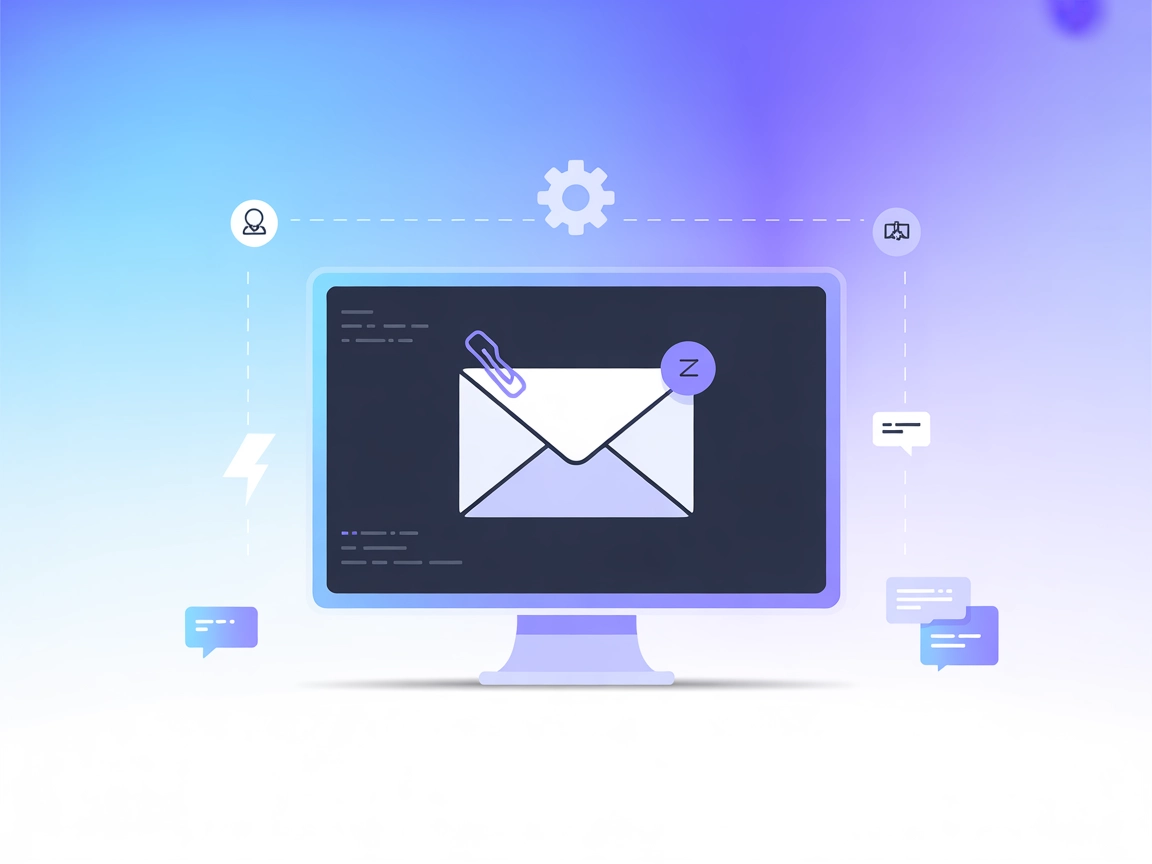
Email MCP Server
The Email MCP Server integrates AI assistants with external email systems, enabling automated email sending, file attachments, and SMTP validation through a str...

Enable your AI workflows to send emails programmatically using the Resend MCP Server connector for FlowHunt.
FlowHunt provides an additional security layer between your internal systems and AI tools, giving you granular control over which tools are accessible from your MCP servers. MCP servers hosted in our infrastructure can be seamlessly integrated with FlowHunt's chatbot as well as popular AI platforms like ChatGPT, Claude, and various AI editors.
The Resend MCP Server acts as a bridge between AI assistants and the Resend email API, enabling seamless integration of email-sending capabilities into AI-powered workflows. By exposing the functionality of the Resend API through the Model Context Protocol (MCP), this server allows AI agents to send emails, manage email content, and interact with email-related resources programmatically. This integration is particularly valuable for automating notifications, transactional emails, and communication processes within development environments, thereby enhancing productivity and enabling complex automated workflows involving email communication.
No prompt templates are mentioned in the available files or documentation.
No resources are explicitly listed in the available files or documentation.
No tools are explicitly listed in the available files or documentation, including server.py.
{
"mcpServers": {
"resend": {
"command": "npx",
"args": ["@klavis/mcp-server-resend@latest"]
}
}
}
{
"mcpServers": {
"resend": {
"command": "npx",
"args": ["@klavis/mcp-server-resend@latest"]
}
}
}
{
"mcpServers": {
"resend": {
"command": "npx",
"args": ["@klavis/mcp-server-resend@latest"]
}
}
}
{
"mcpServers": {
"resend": {
"command": "npx",
"args": ["@klavis/mcp-server-resend@latest"]
}
}
}
Store API keys in environment variables rather than in configuration files. Example:
{
"mcpServers": {
"resend": {
"command": "npx",
"args": ["@klavis/mcp-server-resend@latest"],
"env": {
"RESEND_API_KEY": "${RESEND_API_KEY}"
},
"inputs": {
"apiKey": "${RESEND_API_KEY}"
}
}
}
}
Using MCP in FlowHunt
To integrate MCP servers into your FlowHunt workflow, start by adding the MCP component to your flow and connecting it to your AI agent:

Click on the MCP component to open the configuration panel. In the system MCP configuration section, insert your MCP server details using this JSON format:
{
"resend": {
"transport": "streamable_http",
"url": "https://yourmcpserver.example/pathtothemcp/url"
}
}
Once configured, the AI agent is now able to use this MCP as a tool with access to all its functions and capabilities. Remember to change “resend” to whatever the actual name of your MCP server is and replace the URL with your own MCP server URL.
| Section | Availability | Details/Notes |
|---|---|---|
| Overview | ✅ | |
| List of Prompts | ⛔ | No prompt templates found |
| List of Resources | ⛔ | No resources found |
| List of Tools | ⛔ | No tools found in server.py |
| Securing API Keys | ✅ | Documented with example |
| Sampling Support (less important in evaluation) | ⛔ | Not mentioned |
Based on the available documentation, the Resend MCP Server provides clear setup instructions and addresses security for API keys, but lacks details on prompts, resources, and tools. It appears to be a useful integration for email-related workflows, but the absence of explicit MCP features such as tools and resources may limit its out-of-the-box functionality.
Score: 3/10 (Basic documentation and setup, but missing core MCP features.)
| Has a LICENSE | ⛔ (not found in the provided directory) |
|---|---|
| Has at least one tool | ⛔ |
| Number of Forks | Not available |
| Number of Stars | Not available |
The Resend MCP Server connects AI assistants to the Resend email API, allowing automated email-sending, content management, and programmatic interaction with email resources as part of your workflows.
It is ideal for automated notifications, transactional emails, workflow communication, bulk email updates, and integration testing within development environments.
Store API keys in environment variables rather than configuration files to keep them secure. Refer to the server setup instructions for examples.
No prompt templates, resources, or explicit tools are included in the documentation or server files. The main feature is direct API integration for email workflows.
The MCP Score is 3/10, as the server covers setup and security but lacks advanced MCP features like tools and prompt templates.
Supercharge your automated workflows by enabling AI-powered email sending and notifications. Integrate the Resend MCP Server into your FlowHunt flows today.

The Email MCP Server integrates AI assistants with external email systems, enabling automated email sending, file attachments, and SMTP validation through a str...

The Email MCP Server for FlowHunt bridges AI assistants with email systems, enabling automated email composition, attachment searching, and streamlined communic...

The Mailgun MCP Server bridges AI assistants with Mailgun’s email APIs, enabling programmatic email sending, analytics retrieval, and workflow automation within...
Cookie Consent
We use cookies to enhance your browsing experience and analyze our traffic. See our privacy policy.